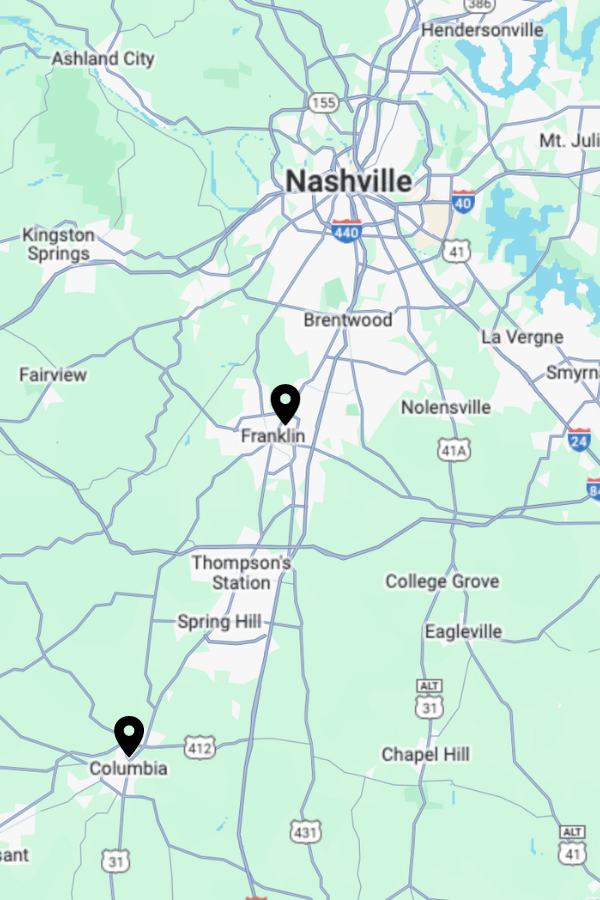Apex Recovery operates rehab facilities across Middle Tennessee. These facilities provide comprehensive treatment programs for people struggling with addiction. With locations in these two states, Apex Addiction Recovery Center offers accessible and effective rehabilitation services to those in need within these regions, supporting those on their journey towards recovery.
Apex Drug and Alcohol Addiction Recovery Center is in-network with numerous health insurance providers, ensuring residential treatment programs are accessible to a broader audience. By accepting insurance, Apex Recovery allows for a smoother admission process for those seeking “help near me” with addiction, making the path to recovery financially feasible for people covered by participating health insurance networks.

Free Addiction Assessment
Schedule a free, confidential assessment with a licensed clinician. Apex Recovery can check your insurance coverage levels for drug and alcohol addiction, and mental health treatment.
What is the 12-Step Addiction Program?
The 12-Step Addiction Program is a structured approach to addiction recovery initially developed by Alcoholics Anonymous (AA). It involves a series of principles and actions helping facilitate sobriety and personal growth. Participants acknowledge powerlessness over their addiction, seek addiction support through group meetings, make amends for past wrongs, and commit to ongoing spiritual and moral development.
The steps encourage self-reflection, accountability, and reliance on a higher power. Adapted by various twelve-step groups, including Narcotics Anonymous and Gamblers Anonymous, the 12 Step program for addiction remains a widely used framework for people seeking recovery from substance abuse and other addictive behaviors.
Statistics on 12-Step Addiction Programs
12-step programs, a cornerstone of addiction recovery efforts, report a median abstinence length of five years among their completers, with a third achieving 1-5 years of sobriety. Typically, these programs involve 2-4 meetings weekly. Only 11% of AA’s membership is under 30, with a mere 2% under 21 years old.
AA boasts over 2 million members globally, showing its widespread acceptance and support. Economically, these programs have the potential to reduce mental health costs by up to $10,000 per person. Research indicates that 12-step programs are 60% more effective than other therapeutic methods, leading to higher continuous abstinence rates and equal efficacy in reducing drinking intensity compared to alternative approaches.

- Please complete and send the form below.
- One of our staff members will contact your insurer to check your coverage.
- We will contact you promptly with the results and to discuss the next steps.
Insurance Verification
"*" indicates required fields
How To Find 12-Step Drug and Alcohol Addiction Programs Near Me
To find 12-Step Drug and Alcohol Addiction Programs nearby, explore options for inpatient and outpatient treatment centers in Middle Tennessee. Whether you seek intensive or flexible care, Apex Recovery offers local comprehensive support. Contact us at (877) 881-2689 to begin your journey toward recovery with guidance tailored to your needs.
Free Addiction Assessment
Schedule a free, confidential assessment with a licensed clinician. Apex Recovery can check your insurance coverage levels for drug and alcohol addiction, and mental health treatment.

Inpatient and Outpatient Treatment Centers in Middle Tennessee (TN)
Apex Addiction Recovery Center in Tennessee offers specialized inpatient and outpatient treatment options across two prime locations. Our facilities include Apex Recovery Franklin and Apex Recovery Columbia. These centers provide personalized support in the heart of Middle Tennessee.
Apex Recovery Franklin
4601 Carothers Pkwy STE 250A
Franklin, TN 37067
Apex Recovery Columbia
2710 Trotwood Ave STE A & B
Columbia, TN 38401

12-Step Drug and Alcohol Addiction Recovery Program Explained
The 12-Step Drug and Alcohol Addiction Recovery Program is a structured, spiritual framework for overcoming addiction. It begins with admitting powerlessness over the addiction, recognizing a higher power, and progresses through self-examination, making amends for harm done, and working to improve spiritual and personal conduct. Continual reflection and helping others complete the transformative journey of the twelve-step philosophy.
Step 1: Admitting Powerlessness
Step 1 of the 12-Step Program, “Admitting Powerlessness,” involves acknowledging that one’s life has become unmanageable due to addiction. This crucial first step sets the foundation for recovery by recognizing the inability to control substance use on one’s own, emphasizing the need for external support and marking the beginning of a twelve-step healing journey towards regaining control over one’s life.
Step 2: Believing in a Higher Power
Step 2, “Believing in a Higher Power,” encourages people to embrace the possibility that a power greater than themselves can restore sanity. This step is about opening up to spiritual principles and acknowledging that recovery involves forces beyond personal willpower. It lays the groundwork for building faith and trust in the recovery process.
Step 3: Turning Your Will Over
Step 3 involves “Turning Your Will Over” to a higher power. This step signifies a conscious decision to surrender control and trust in a greater force to guide one’s life and recovery journey. It marks a pivotal moment of acceptance and willingness to seek guidance and support beyond one’s own limitations in pursuit of sobriety and personal growth.
Step 4: Taking a Moral Inventory
Step 4, “Taking a Moral Inventory,” is a profound and introspective process where people catalog their strengths and weaknesses, assessing personal behaviors, attitudes, and the impact of their addiction. This self-examination unearths underlying issues contributing to substance abuse, fostering honesty and self-awareness. It’s a critical step towards understanding oneself and laying a foundation for genuine change and healing.
Step 5: Admitting Wrongs
Step 5, “Admitting Wrongs,” entails openly acknowledging to oneself, a higher power, and another person the exact nature of one’s wrongs identified during the moral inventory. This step is vital for healing, as it confronts and releases guilt, fosters accountability, and builds trust. It’s a pivotal moment of vulnerability and truth that reinforces the commitment to recovery.
Step 6: Being Ready for Change
In Step 6, “Being Ready for Change,” people cultivate readiness to let go of negative traits identified in the moral inventory, seeking inner transformation. This step signifies a willingness to work on shortcomings and character defects, preparing for personal growth and spiritual development. It’s a pivotal stage where you commit to embracing positive change on your journey to recovery.
Step 7: Asking for Help
Step 7, “Asking for Help,” involves humbly asking a higher power to remove the shortcomings identified in previous steps. This step emphasizes the importance of seeking external support and acknowledging one’s limitations in overcoming character defects alone. It reflects a crucial aspect of recovery—recognizing the need for divine or spiritual assistance in facilitating personal growth and healing.
Step 8: Making a List
Step 8, “Making a List,” involves compiling a thorough inventory of all persons harmed by one’s addiction. This step requires honesty and humility, as people meticulously catalog the individuals they’ve wronged. It sets the stage for making amends in the subsequent step, fostering accountability and promoting reconciliation with those affected by past actions.
Step 9: Making Amends
Step 9, “Making Amends,” involves reaching out to those harmed by one’s addiction to apologize and rectify mistakes, provided it won’t cause further injury. It’s a step of courage and integrity, aiming to mend damaged relationships and clear the conscience. This process is crucial for healing and moving forward, embodying the principles of accountability and restitution in recovery.
Step 10: Continuing Personal Inventory
Step 10, “Continuing Personal Inventory,” involves regularly assessing one’s thoughts, actions, and behaviors to promptly address any harmful patterns or resentments. This ongoing self-reflection fosters accountability and personal growth, ensuring that people remain aligned with their recovery goals. By staying vigilant and honest with themselves, they can keep sobriety within reach and cultivate healthier relationships with others and themselves.
Step 11: Prayer and Meditation
Step 11, “Prayer and Meditation,” emphasizes spiritual connection and mindfulness. People engage in regular prayer or meditation to seek guidance from a higher power and attain inner peace. This step encourages reflection, serenity, and the cultivation of spiritual strength, providing a source of comfort and guidance throughout the recovery journey. It fosters a deeper connection to oneself and the universe.
Step 12: Helping Others
In Step 12, “Helping Others,” people extend a hand to those still struggling with addiction, sharing their experience, strength, and hope. By giving back to the community and offering support, they reinforce their own recovery while making a positive impact on others’ lives. This step embodies the principle of altruism, fostering a sense of purpose and fulfillment in sobriety.
Does Insurance Cover 12-Step Substance Abuse Programs?
Health insurance coverage for co-occurring disorders/Dual Diagnosis treatment varies depending on the policy and provider. Many insurance plans offer coverage for these services, including detoxification, therapy, and medication management. However, the extent of coverage and specific treatments included can differ. It’s crucial for individuals to review their insurance policies carefully and verify coverage details.
At Apex Alcohol and Drug Addiction Recovery Center, we work with various insurance providers to help people navigate their coverage options for co-occurring disorders/Dual Diagnosis interventions. Contact us today online or call us at (877) 881-2689 to speak with our knowledgeable team and learn more about how we can assist you in accessing the care you need. We can also check your insurance quickly to get started at our co-occurring disorders addiction treatment centers. Please visit our insurance page for all the details.
How Much Does 12-Step Addiction Programs Cost?
The cost of 12-Step addiction programs can vary widely depending on the format and the provider. Community-based 12-Step meetings, such as those offered by Alcoholics Anonymous (AA) or Narcotics Anonymous (NA), are typically free and open to anyone seeking help for their addiction. These programs are funded by voluntary donations from members.
However, when 12-Step principles are integrated into formal rehabilitation programs at inpatient or outpatient facilities, costs can range significantly. These programs may include professional counseling, medical treatment, and comprehensive support services. Prices can vary from a few thousand dollars for outpatient services to tens of thousands for residential treatment programs. Insurance may cover part of these costs, but coverage levels and out-of-pocket expenses will vary by policy.
Is The 12-Step Addiction Recovery Program Evidence-Based?
The 12-Step addiction recovery program has become a cornerstone in the treatment of addiction, embraced by millions globally for its effectiveness in fostering long-term sobriety. Recognized as an evidence-based approach, it is integrated into numerous drug and alcohol rehabilitation protocols. The program’s success lies in its structured support system, promoting accountability, mutual aid, and personal growth.
Research underscores its efficacy, highlighting significant improvements in recovery rates and sustained abstinence among participants. By encouraging a holistic twelve-step approach to recovery, including spiritual and emotional healing, the 12 Step program alcohol and drug approach continues to be a vital tool in the battle against addiction.

Are There Alternatives to the Twelve Steps and AA Programs?
Yes, there are alternative approaches to the Twelve Steps and Alcoholics Anonymous (AA) programs for addiction recovery. Some people may find success with non-12-Step programs like SMART Recovery, which emphasizes self-empowerment, cognitive-behavioral therapy techniques, and scientific principles. Others may benefit from holistic or faith-based programs, such as Celebrate Recovery or Refuge Recovery, which incorporate spiritual and mindfulness practices.
Additionally, individual therapy, group therapy, medication-assisted treatment, and other evidence-based modalities offer alternatives tailored to specific needs and preferences. The key is finding a program or combination of approaches that resonate with the person and support their journey to recovery.

Is 12-Step Addiction Recovery Programs for Religious People?
While 12-Step addiction recovery programs often reference spiritual concepts, they are not exclusively for religious individuals. These programs welcome people from all backgrounds and beliefs, promoting inclusivity and respect. The spiritual aspect of the Twelve Steps is broadly interpreted, allowing people to define their higher power according to their personal understanding, whether it’s rooted in religion, nature, community, or personal values.
The emphasis is on a spiritual connection rather than adherence to specific religious doctrines. This inclusivity enables people of varying faiths, as well as atheists and agnostics, to benefit from the principles and support offered by alcoholism 12 Step programs in the area.

Additional Rehab and Insurance Guide
Statistics on 12-Step Addiction Treatment Programs
- The median length of abstinence for those completing a 12-step program is 5 years
- One third of those completing a 12-step program have between 1 – 5 years of abstinence
- 12-step programs average between 2 and 4 meetings per week
- Only 11% of AA members are under 30 years old
- 2% of AA and NA members are under 21
- AA has over 2 million members worldwide
- 12-step programs can reduce mental health costs by up to $10,000 per person
- A study showed AA and 12-step to be 60% more effective than other programs
- 12-step programs produce higher rates of continuous abstinence than many other programs
- 12-step programs performed as well as other programs at reducing drinking intensity
Sources:
